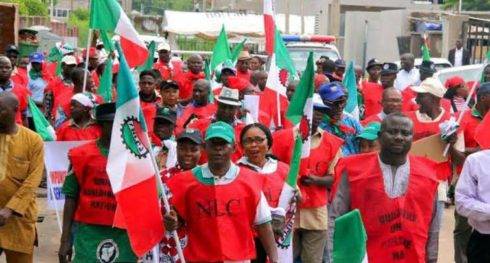As Labour Union in Nigeria commemorated May Day, the anticipated announcement of a new minimum wage was met with disappointment as negotiations hit a stalemate. The impasse underscores the delicate balance between addressing workers’ needs and navigating economic constraints.
The deadlock primarily revolves around the disparity between labour’s Union demand for a minimum wage of N615,000 and the government’s cautious approach to avoid economic instability. While the government acknowledges the necessity of improving workers’ livelihoods, it emphasizes the need for a balanced approach that considers the broader economic landscape. Economists caution that a sharp increase in the minimum wage could exacerbate inflationary pressures and strain fiscal resources, potentially derailing the country’s economic recovery efforts.
In response, the Federal Government has opted to incrementally adjust the salary scales of certain workers, signaling its commitment to addressing income disparities while mitigating the risk of destabilizing the economy. However, this interim measure has failed to appease labour unions, who remain steadfast in their demand for a substantial wage hike. As negotiations persist, stakeholders are urged to seek common ground that upholds workers’ rights without jeopardizing economic stability.
Navigating Economic Realities
The protracted negotiations over the minimum wage highlight the intricate challenge of reconciling workers’ aspirations with economic realities. Amidst rising inflation and sluggish growth, policymakers face the daunting task of fostering sustainable wage growth without undermining macroeconomic stability.
Labour unions advocate for a significant increase in the minimum wage to address the widening income gap and alleviate poverty. However, economists caution that an indiscriminate raise could trigger a domino effect, leading to higher production costs, reduced competitiveness, and potential job losses, particularly in the informal sector. Moreover, the specter of inflation looms large, threatening to erode the purchasing power of households and further exacerbate socio-economic inequalities.
In response, the government must adopt a nuanced approach that balances the imperative of social justice with the exigencies of economic prudence. This entails exploring alternative policy instruments, such as targeted social welfare programs and skills development initiatives, to uplift vulnerable segments of the workforce while safeguarding macroeconomic stability. Moreover, fostering a conducive business environment that incentivizes investment and job creation is paramount to fostering sustainable wage growth in the long run.
Stalemate in Wage Negotiations: Government and Labour Union at Loggerheads
Both the government and labour unions are embroiled in a contentious deadlock over the issue of minimum wage. The tripartite committee tasked with determining the new wage remains deadlocked in negotiations, with labour Union proposition of a N615,000 minimum wage drawing widespread criticism. Analysts and economists caution that such a steep increase could further strain the already fragile economy, potentially triggering a free fall of the naira.
While the current minimum wage of N30,000, established in 2019, is universally acknowledged as insufficient, the demand by labour unions for a nearly twenty-fold increase has been met with staunch opposition. Critics argue that such a drastic escalation would have catastrophic repercussions on the economy, leading to irreparable damage to the currency.
Bogus Minimum Wage” Sparks Debate
The insistence of labour unions on a significantly higher minimum wage has been labeled as “bogus, unrealistic, and outrageous” by critics. They argue that such a steep hike would exacerbate the existing economic challenges, further destabilizing the financial landscape of the country. The ramifications of implementing such a wage increase without careful consideration of its long-term implications could be severe, potentially derailing the fragile economic recovery process.
Government’s Response: Incremental Salary Raises and Sector-Specific Adjustments
In response to the escalating demands, the Federal Government has opted for a more nuanced approach. Rather than acceding to the blanket demand for a higher minimum wage, the government has announced a 25% to 35% salary raise for specific sectors covered by various salary structures. These adjustments include sectors such as education, research, policy, para-military, intelligence, and the armed forces.
However, labour Union has dismissed these measures as a strategic maneuver to circumvent their demands. President of the Nigerian Labour Congress (NLC), Joe Ajaero, highlighted the inadequacy of the existing minimum wage and criticized the government’s failure to provide a concrete solution to address the plight of workers.
Finding a Middle Ground: Balancing Economic Realities and Worker Well-being
Beyond the economic arguments, the dire need to enhance worker welfare cannot be overstated. For many Nigerians, the current minimum wage barely covers basic necessities, pushing them into a cycle of poverty and financial insecurity. However, amidst these pressing concerns, analysts emphasize the importance of tempering demands with economic realities.
The path forward necessitates a delicate balance between addressing the immediate needs of workers and safeguarding the long-term stability of the economy. As negotiations continue, both the government and labour unions must prioritize a swift and amicable resolution to avoid any adverse impact on the economy. Implementing sustainable wage increases, supported by comprehensive revenue generation measures and economic reforms, is imperative to ensure a prosperous future for all Nigerians.
In navigating the minimum wage negotiations requires a nuanced understanding of both the socio-economic landscape and the aspirations of the workforce. Learning from successful models in other countries and fostering constructive dialogue between stakeholders can pave the way for a mutually beneficial outcome.
Table of Contents
Discover more from OGM News NG
Subscribe to get the latest posts sent to your email.














